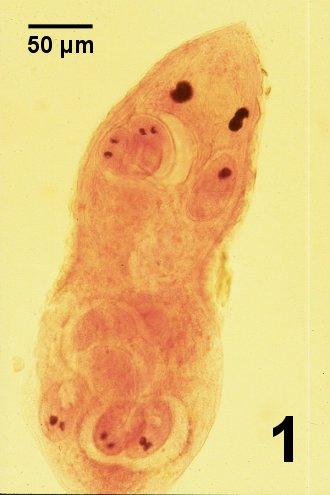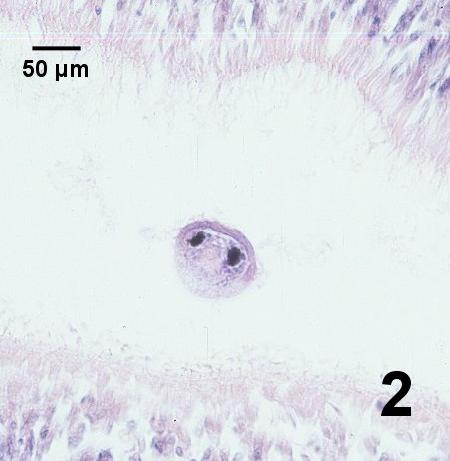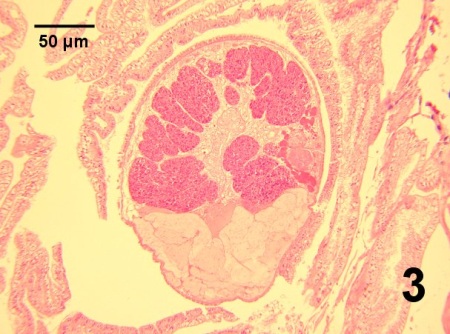Turbellaria of Clams
On this page
Category
Category 4 (Negligible Regulatory Significance in Canada)
Common, generally accepted names of the organism or disease agent
Turbellaria of clams.
Scientific name or taxonomic affiliation
Rhabdocoela of the family Graffillidae and Urastoma cyprinae in the family Urastomidae (Prolecithophora).
Geographic distribution
Described from European and North American coastal waters, U. cyprinae was reported from Tridacna gigas and Tridacna maxima from the Great Barrier Reef, Australia; probably global distribution.
Host species
Numerous species of clams and other bivalves including oysters and scallops.
Impact on the host
No known affect on host. Thought to pass freely between the mantle cavity and alimentary canal. Often observed on the surface of the gills. Rarely observed in the lumen of the kidney. Suggested to be midway between being endocommensal and parasitic.
Diagnostic techniques
Squash Preparations
Thin slices (about 3 mm thick) of the clam body pressed between two plexiglass plates and examined under a dissecting microscope (50 x) show turbellaria within the alimentary tract.

Figure 1. Whole mount of a gravid Graffillidae-like turbellarian from the intestinal tract of a Japanese littleneck clam, Venerupis (=Tapes) philippinarum, from a beach in southern British Columbia. Semichon's acetic acid-carmine stain (Noble and Noble 1962).
Histology
Cross sections of turbellaria can be observed adjacent to the gills or mantle, or within the lumen of the gut and kidney.

Figure 2. Histological section through the eye spots of a turbellarian in the lumen of the gut of a Japanese littleneck clam, Venerupis (=Tapes) philippinarum, from a beach in southern British Columbia. Hematoxylin and eosin stain.

Figure 3. Histological section through a turbellarian in the lumen of the kidney of a varnish clam, Nuttallia obscurata, from a beach in southern British Columbia. Although the kidney was grossly distended to accommodate this large turbellarian, no tissue damage was evident. Hematoxylin and eosin stain.
Methods of control
Prevention and control impractical.
References
Bower, S.M., J. Blackbourn and G.R. Meyer. 1992. Parasite and symbiont fauna of Japanese littlenecks, Tapes philippinarum (Adams and Reeve, 1850), in British Columbia. Journal of Shellfish Research 11: 13-19.
Carballal, M.J., D. Iglesias, J. Santamarina, B. Ferro-Soto and A. Villalba. 2001. Parasites and pathologic conditions of the cockle Cerastoderma edule populations of the coast of Galicia (NW Spain). Journal of Invertebrate Pathology 78: 87-97.
Goggin, C.L. and L.R.G. Cannon. 1989. Occurrence of a turbellarian from Australian tridacnid clams. International Journal for Parasitology 19: 345-346.
Lauckner, G. 1983. Diseases of Mollusca: Bivalvia. In: O. Kinne (ed.). Diseases of Marine Animals. Volume II: Introduction, Bivalvia to Scaphopoda. Biologische Anstalt Helgoland, Hamburg, p. 630-632.
Marshall, W.L., S.M. Bower and G.R. Meyer. 2003. A comparison of the parasite and symbiont fauna of cohabiting native (Protothaca staminea) and introduced (Vennerupis philippinarum and Nuttalia obscurata) clams in British Columbia. Journal of Shellfish Research 22: 185-192.
Noble, E.R. and G.A. Noble. 1962. Animal Parasitology: Laboratory Manual. Lea and Febiger, Philadelphia. 120 pp.
Citation Information
Bower, S.M. (2004): Synopsis of Infectious Diseases and Parasites of Commercially Exploited Shellfish: Turbellaria of Clams.
Date last revised: May 2004
Comments to Susan Bower
- Date modified: